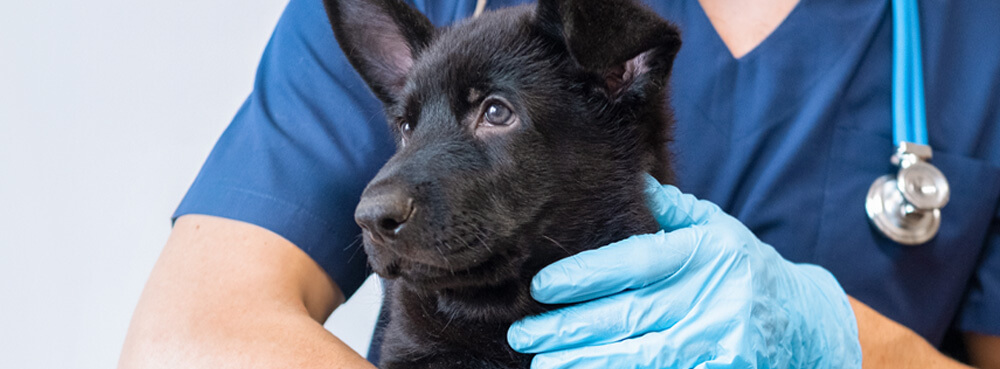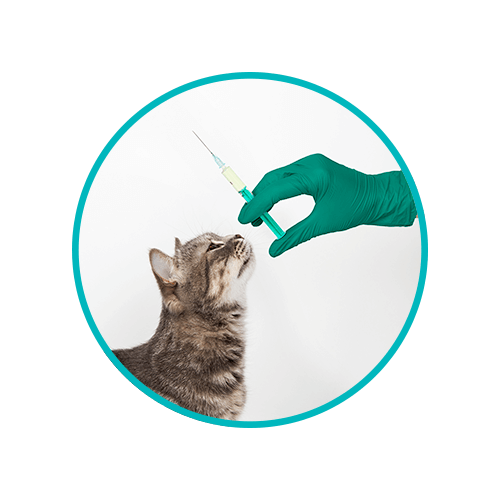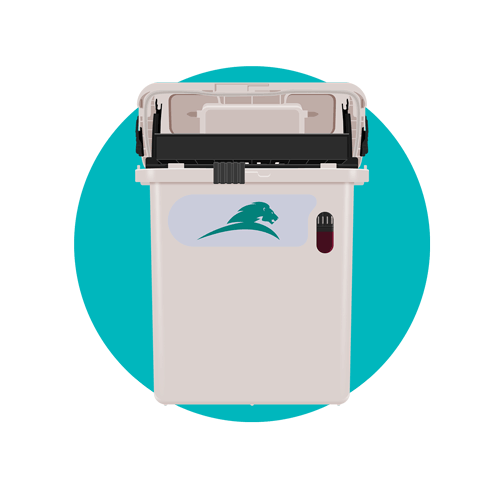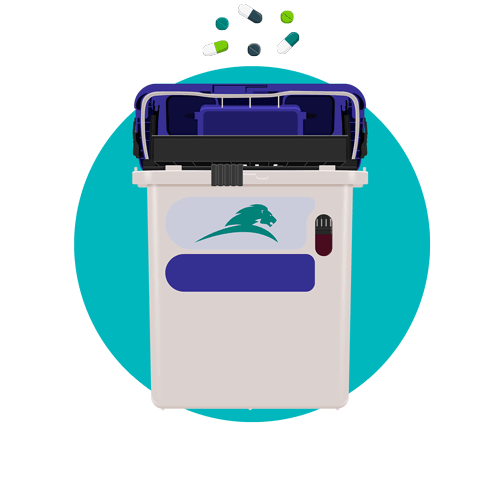Compliant Medical Waste Guide: Veterinary Clinics

As a part of a veterinary clinic, you work hard every day to care for beloved pets and livestock. In this fast paced, high stress environment, the last thing you want to spend extra time on is waste disposal. Ideally, medical waste disposal should be as easy as throwing away an empty wrapper in the right recycling bin. However, it does take a little work upfront to get there and choosing the right waste management partner is often the key to getting there. Let’s take a look at what it takes to achieve a compliant waste management plan that’s streamlined and user-friendly for the veterinary clinic environment.
TOPICS WE WILL COVER:
1 / What Veterinary Practices Need to Know
2 / Regulations and Agencies to Watch Out for
3 / Containers for Biohazardous, Pathological, or Regulated Medical Waste
4 / Planning Ahead Makes Compliance Easier
What Veterinary Practices Need to Know

The key takeaway: Just because veterinarians work with animals and not humans does not mean the medical waste they generate is any less regulated. Laws covering the disposal of biomedical, sharps, pharmaceutical, and other forms of medical waste apply regardless of the patients involved. Failure to achieve compliance could result in steep fines and lawsuits.
How does achieving compliance start? Here are several key steps to staying ahead of regulations.
Research the applicable laws for your area. Become aware of the city or county, state, and federal rules that do or could cover your practice. Conferring with a legal expert or waste management partner that is already familiar with local and nationwide requirements may be the easiest way to do this.
Identify the regulated waste types your veterinary clinic deals with. Does your practice offer needed prescriptions for pets? If so, you’ll need to manage pharmaceutical waste disposal. Almost every clinic handles anatomical waste, which falls under the common but sensitive category of biohazardous waste. Sharps are another type of waste that requires specialized containment and elimination. Work to identify every category your veterinarian practice encounters.
Obtaining color-coded containers is an integral part of efficiently keeping different types of waste segregated. This will also help ensure they are disposed of according to the correct and legal process. Some types of waste may still head to a landfill in the end, whereas others may need to be burnt or autoclaved, depending on your local regulations.
Educate the entire team on proper waste disposal. Non-compliance costs money. Sometimes, the fines imposed for non-compliance can be many thousands per day. One violation may be all it takes. Even more innocent mistakes, like throwing an item suitable for the general waste stream away in a specialized medical waste container, may increase waste disposal costs.
Regulations and Agencies to Watch Out for
 When researching what laws to abide by, you will likely come across a few key names. Here’s a list of the agencies that may enforce laws concerning medical waste disposal in your area:
When researching what laws to abide by, you will likely come across a few key names. Here’s a list of the agencies that may enforce laws concerning medical waste disposal in your area:
- Environmental Protection Agency
- Occupational Safety and Health Administration
- Drug Enforcement Agency
- Department of Transportation
- Centers for Disease Control
These are not the only legal sources to look out for–state and local regulations can supersede other laws. Always be mindful of the strictest laws that pertain to your practice.
Containers for Biohazardous, Pathological, or Regulated Medical Waste
As you’re probably well aware, veterinary clinics create a great deal of pathological waste–in this case, animal body parts, including organs, tissues, surgical specimens, or bodily fluids. Biohazardous waste includes this, as well as anything contaminated by these things, such as PPE (such as gloves and masks), needles, scalpels, and syringes. All these things fall under the category of regulated medical waste. Non-contaminated waste, like unused needles or animal carcasses, may not be biohazardous, but they still require specialized disposal to comply with laws.
Medismart by Daniels Health satisfies the varied demands of a busy veterinary clinic for regulated medical waste disposal. The system is fully touchless, leak- and tamper-proof, bag and box-free, mobile for point-of-generation disposal, and reusable. Once full, Daniels picks up and sanitizes the containers using our thorough Washsmart process that guarantees decontamination to a level four times higher than that required by the CDC.
Containers for Sharps

Syringes, needles, scalpels, broken vials, and ampules–anything that qualifies as sharp requires specialized disposal. It falls under regulated medical waste and may be put in smaller containers that can be disposed of in larger medical waste containers once filled. Improperly eliminated sharps can lead to injuries or even very serious infections–not to mention lawsuits from impacted workers.
Sharpsmart offers a reusable, safety-engineered, endlessly-customizable sharps container solution. A suite of mounting, movement, and location accessories ensure containers can be seamlessly incorporated into any space. Peer-reviewed studies show Sharpsmart reduces sharps injuries in a medical setting by up to 87%. Appropriately segregating and discarding sharps with Sharpsmart saves time and labor, as well as helping to prevent injuries, ensure compliance, and keep staff safer.
Containers for Pharmaceuticals

From expired pills to used medication patches, vets see a lot of pharmaceutical waste within their walls. It is crucial for both compliance and staff and patient safety to eliminate this waste properly. Preventing tampering stops the misuse and abuse of disposed drugs. Moreover, ensuring suitable disposal avoids incurring fines for non-compliance. While flushing medications or mixing them with kitty litter might technically satisfy legal requirements in your region, these methods are not ideal.
For both hazardous and non-hazardous medication disposal, Pharmasmart by Daniels gets the job done. Tampering prevention features like hand-restrictive design and permanent side locks stop unauthorized retrieval of contents. Secure pickups and disposal from the Daniels team safeguard against mishandling.
However, for drugs that must be witness-wasted, Secure a Drug is a perfect solution. This fast-acting solvent chemically destroys medications in an environmentally friendly way. Secure a Drug is available in a wide variety of sizes, perfect for smaller clinics that produce less waste, and it is safe, affordable, and effortless for staff to use. Incorporating Secure a Drug to render medications’ active ingredients inert can go a long way to making compliance easier to achievse.
Planning Ahead Makes Compliance Easier
If you’re a part of a veterinary clinic, you and your team have their hands full caring for people’s beloved pets and livestock. Thinking about disposing of medical waste should be one of the last things on their mind. Incorporating waste disposal smartly and seamlessly into the staff’s workflow not only saves time, but also helps to prevent extraneous costs and headaches from occurring. Partnering with a reliable waste management company like Daniels takes the burden away with intelligently-designed, proven waste solutions. Reach out to our helpful team for guidance on the products that are right for your clinic’s size and waste disposal needs.
Let's Talk!
Your time is valuable, and we don’t want to play hard to get. You can either phone us directly on the details listed on our contact page, or feel free to fill out this short form and one of our team members will get back to you as quickly as possible.
